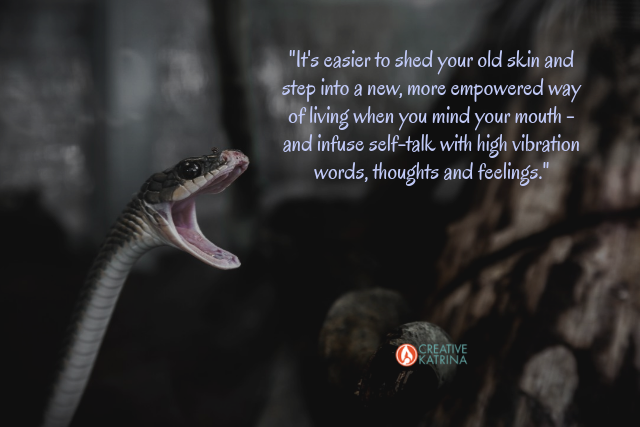It’s not always easy to mind your mouth.
At times, thoughts or emotions racing through the brain can hijack your voice, prompting you to say something disguised as your “truth”. In other scenarios the mind shifts into default mode, leading you to share something that feels disconnected or flat. And let’s not forget how negative self-talk can weasel in when you already feel low.
Regardless of your personal experience, the specific words, tone and focus of self-talk can have a big influence many things, including the wellness of the mind, body and soul.
The words that flow through your mind have the same power as the ones being spoken aloud, but are significantly amplified. Why? Most of the time you aren’t even aware you are thinking them – and they play in the background all day long.
So why is it so hard to put “minding your mouth” into practice? Here are a few of the most common reasons:
- Emotions can carry you to intense places in an instant, and it’s easy to react emotionally from that space.
- When you feel fearful or “less than” it seems safer not to share, even if it may help you create stronger boundaries.
- The mind can to lock into a negative thought and stay there, indefinitely.
- It takes practice and work to change old patterns in order to honor the desire to shift into something different.
- Owning responsibility for how you talk to yourself requires extra special effort, especially when moving through transition.
- Many self-talk habits are formed in childhood, but we aren’t always shown how to flip them into something positive.
Most importantly, we can’t always see the direct connection of self-talk on wellbeing and happiness.
Deciding to Take a Mindful Leap – What is it Worth to You?
While each of us contends with our own inner ego battles, it’s easy to forget what Don Miguel Ruiz says so succinctly about the power of words in his book, The Four Agreements. The essence of your word is so influential, it’s featured as the first agreement:
“Be Impeccable With your Word.”
“The word is not just a sound or a written symbol. The word is a force; it is the power you have to express, communicate, to think and thereby to create the events in your life. You can speak. What other animal on the planet can speak? The word is the most powerful tool you have as a human; it is the tool of magic. But like a sword with two edges, your word can create the most beautiful dream , or your word can destroy everything around you.”
The effort to speak nicely to yourself can definitely feel strange at first, but it starts to feel more natural and flows with ease the more you do it. You had to learn how to brush your teeth and groom yourself, now these tasks are a well-worn reflex. When you take care to mind your mouth, it’s truly just another form of wellness maintenance that becomes a healthy habit.
This awareness practice has a huge impact on how you see everything. Creative ideas and connections increase in frequency. Boundaries become crystal clear, and you can see which ones need a bit of a refresh. Your confidence grows. This collection of little efforts to “mind your mouth” supercharge you from the inside out – as you practice in small, repeatable ways – and have a powerful impact. Each time you use them, they grow in strength and intensity.
For HSP’s and empaths it’s essential to practice mindful words and to be clear on the “roots” of what they say. It’s very easy for sensitives to connect with the emotions and thought patterns of others and take ownership of them without realizing it.
Here’s a very simple example of a mindful practice in action.
My massage therapist encouraged me to say hello to my organs every morning and thank them when I go to sleep. These acknowledgements help me connect with how my body is working, and show gratitude and appreciation for all the work they do.
Even if this seems hokey or strange, the underlying message is clear. When you mind your mouth and what you say to yourself, it shifts awareness away from idle or negative mental chatter towards something much more empowering for the physical body, heart and soul.
5 Things to Help you Monitor and Shift into More Mindful, Loving Self-Talk
To shift into healthy ways to mind your mouth, here are simple awareness tips:
- Is there a thought that hangs out in the back of your mind, all day every day? Can you narrow in on what it is and the words/tone you use? Meditate on it.
- Are there certain words part that have become part of your default language because of family or friends? How does it feel when you use them?
- Do you cringe when you say certain words because they represent old, worn out patterns you want to release?
- Take notice of any patterns related to statements or proclamations you make regularly, such as – “I’m always so clumsy”. How are you using them as a crutch or to perpetuate negative self-talk?
- How can you flip the script of what you say to yourself and transform it into something more positive and empowering using different words?
I invite you to use the next 48 hours to be more mindful of what you think, say to yourself and express out loud. Track patterns and connect the dots between situations and people. See where your buttons are getting pushed, and find ways to create or reinforce boundaries using positive words that are in integrity with your true self.
Taking time to honor yourself in this way has a ripple effect in the world around you. It reveals areas of growth and inspires new creative connections that lead to deep healing. Remember, the words you choose relate to emotions and a specific vibration, so infuse your self-talk with some high-vibration energy!
How can you be more impeccable with your word by using healthy ways to mind your mouth?
Want to read a little more on managing mental chatter? Check out my previous posts Want to Get Out of your Head? Talk Out Loud to Yourself and Can you Tell When Judgment Creep Snuffs Out Your Creative Spark? Want to do a little more of a deep dive into your negative self talk patterns? Connect with me for an intuitive reading. Want insights on how to tap into your inner wisdom on a deeper level? Listen to my podcast, Flirting With Enlightenment.


